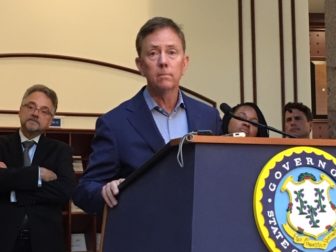The governor said even more borrowing may have to shift away from other items to transportation if electronic tolling is not approved.
By Keith M. Phaneuf, CTMirror.org
Gov. Ned Lamont threatened Wednesday to clamp down on state borrowing if legislators can’t agree in special session this summer on a plan to toll Connecticut’s major highways.
The governor, who made his comments during and after the State Bond Commission meeting, also said he’d consider shifting more borrowing capacity away from non-transportation initiatives to support Connecticut’s highways, bridges, and rail lines.
“If that’s the case, we’re going to have to be very selective about what we do going forward,” Lamont said during the meeting.
“We cannot afford to do a lot of these other items if we put all that money into transportation,” he added afterward.
Lamont, who pledged during the campaign to support tolling only on large trucks, reversed himself in February and has since pressed for tolls on all vehicles to repair Connecticut’s aging, overcrowded infrastructure.
Lawmakers declined to adopt any long-term financing plan for transportation work during the regular session, which adjourned on June 5. But they must return to the Capitol later this summer to adopt the annual bond package. And Lamont has asked them to reconsider tolls, saying the status quo can’t continue.
Connecticut will borrow $850 million this coming fiscal year – $75 million more than it averaged over the last two years – for transportation repairs. This borrowing, which is repaid with gas taxes and other revenues from the budget’s Special Transportation Fund, is paired with about $700 million per year in federal transportation grants.
But state and federal funding totaling roughly $1.5 billion per year “is not enough to keep us in a state of good repair,” Lamont said.
Department of Transportation Commissioner Joseph Giulietti has testified Connecticut needs to spend between $2 billion and $2.5 billion per year if it wants to improve the condition of its infrastructure and make key strategic upgrades like replacing the elevated section of Interstate 84 in Hartford of widening I-95 in Fairfield County.
Lawmakers debated two options this spring to increase capital spending this year, but settled on neither.
Electronic tolling on I-84, I-91, I-95, and the Merritt Parkway is projected to raise $600 million to $800 million per year. Lamont backs this option, estimating out-of-state motorists would contribute as much as 40 percent of the revenue, because it would enable the state to avoid more borrowing.
Republicans countered with “Prioritize Progress,” which avoids tolls and instead shifts $700 million-to-$750 million per year in borrowing from school construction, economic development, and other non-transportation programs and makes it available for highway, bridge and rail work.
Political retaliation for opposing tolls?
Some questioned Wednesday whether Lamont – who chairs the bond commission – retaliated politically against the GOP for their anti-toll stand.
The commission approved a total of $1.9 million in financing for upgrades to fire training schools in Democratic legislators’ districts in Torrington and Windham.
But a similar request for help for the Valley Fire School in Beacon Falls – which trains firefighters in the Naugatuck Valley – was left off the agenda.
House Minority Leader Themis Klarides, R-Derby, a staunch opponent of tolls who pushed for aid for the Valley Fire School, said Lamont and his running mate, Lt. Gov. Susan Bysiewicz, pledged last fall during a visit to her district to support upgrades to the school.
“They were very passionate and it was very heartfelt,” Klarides said, adding that the Democratic team pledged their support for the school repeatedly. “Now he’s trying to threaten people and say ‘If you don’t do tolls that I want, schools like this aren’t going to get funded.’ People are sick and tired of politicians saying one thing during their elections and then conveniently forgetting what they said.”
When Rep. Chris Davis of Ellington, one of just two Republicans on the 10-member bond commission, asked whether the Naugatuck Valley school would be funded in the future, Lamont’s deputy commissioner of the Department of Administrative Services, Noel Petra, said ‘We’re evaluating our options at this point.”
Lamont said afterward there was no political retribution. But his answer to Davis during the meeting was: “I’ll get back to you, I think, by the end of the special session to tell you what appetite and what capacity we have to do projects like that.”
The governor added afterward that even if legislators don’t support tolls, he isn’t ready to support the GOP’s Prioritize Progress plan and shift $750 million in borrowing away from school construction, economic development and other non-transportation programs to support highway, bridge and rail projects.
But he said he would be willing to compromise and support a smaller shift if was part of a deal that also included approval of electronic tolling.
Reprinted with permission of The Connecticut Mirror. The author can be reached at [email protected].
Like what you see here? Click here to subscribe to We-Ha’s newsletter so you’ll always be in the know about what’s happening in West Hartford!








